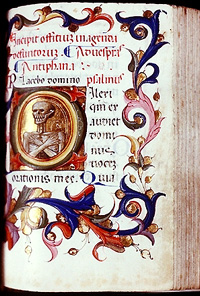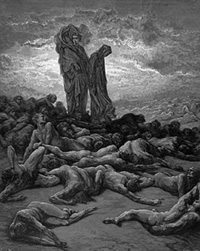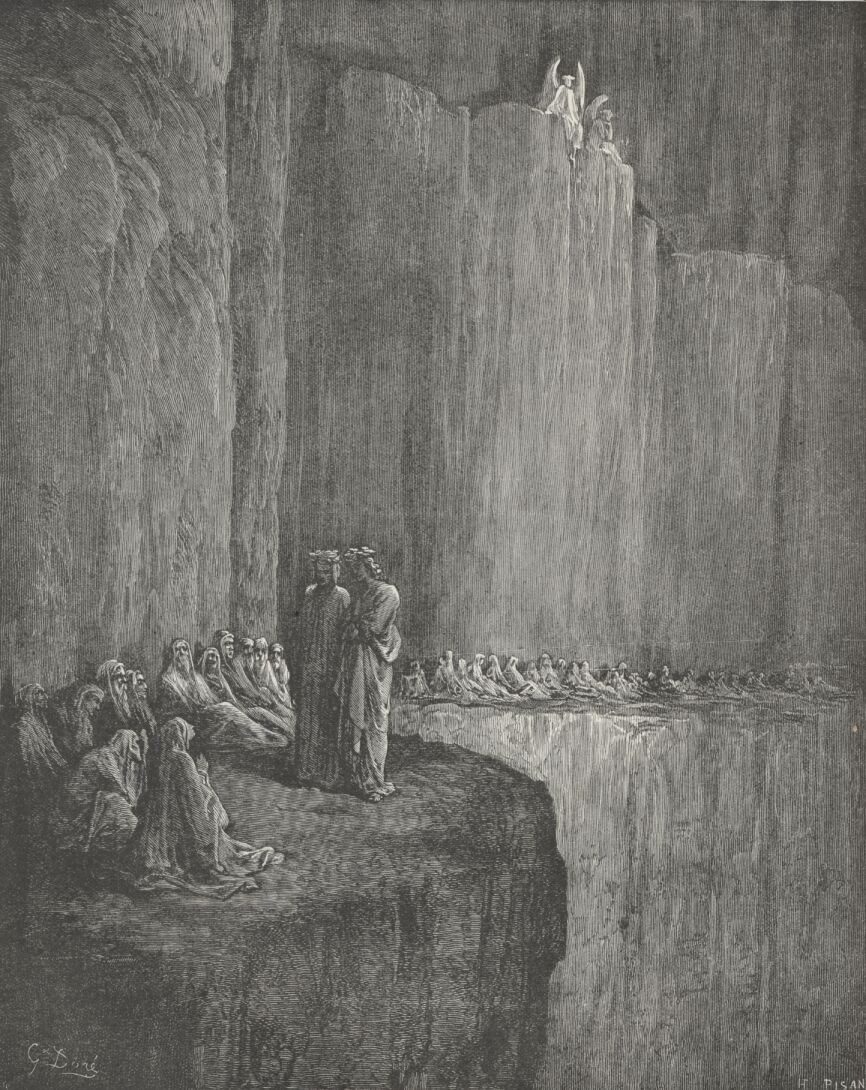Purgatory
 A post last month linked to the Dante's Inferno Test, which caused one reader to write and ask,
A post last month linked to the Dante's Inferno Test, which caused one reader to write and ask,Is it just Catholics that believe in purgatory? And if so, why? And if it is more commonly believed, what happened to being forgiven as long as you repent? Doesn't purgatory imply that for certain sins you are only 'partially' forgiven? And then, wouldn't that mean pretty much every one would pass through purgatory at some point?Yes, the doctrine of purgatory is a uniquely Roman Catholic one. But as the entire church in the west was still part of that one catholic church at the time the doctrine of purgatory arose, it is worth wondering about together.
To get a Roman Catholic take on the doctrine, I went to the New Advent Catholic Encycplopedia. The full article is here, but it says in part
Purgatory (Lat., "purgare", to make clean, to purify) in accordance with Catholic teaching is a place or condition of temporal punishment for those who, departing this life in God's grace, are, not entirely free from venial faults, or have not fully paid the satisfaction due to their transgressions.The Doctrine of Purgatory came from the Council of Florence in 1431, which was called to create some clear statements of the catholic faith in response to some early reformers (particularly the followers of Jan Hus, known as Hussites). That council would not have seen the Doctrine as a new creation, but a formulation of an already held belief.
For most later reformers, including Martin Luther and John Calvin, the rule of thumb for reforming the church was something to the effect of "If it is not in scripture, we won't do it." These church reformers with one voice (which was rare in the Reformation) denounced the doctrine of purgatory, leaving it out of Protestant churches.
But what of the Episcopal Church itself? The reformation which came to England with the break from Rome during Henry VIII's reign (creating in time the Anglican Communion of which King of Peace is a part) opened what they called the via media or a middle path in which if a teaching or practice was contrary to scripture, it was dropped, but things found to be helpful, which were not contrary to scripture, could be retained. The official teaching of the Anglican Communion on purgatory is found in the 39 articles, which are themselves still within our Book of Common Prayer in the historical documents section (pages 867-876). Article XXII states,
The Romish Doctrine concerning Purgatory, Pardons, Worshipping and Adoration, as well of Images as of Relics, and also Invocation of Saints, is a fond thing, vainly invented, and grounded upon no warranty of Scripture, but rather repugnant to the Word of God.
 Having stated that it is not a generally Protestant doctrine, nor one uniquely retained by the Episcopal Church, it is probably still worth exploring where the idea comes from. Roman Catholic theologians would point to I Corinthians 3:11-15,
Having stated that it is not a generally Protestant doctrine, nor one uniquely retained by the Episcopal Church, it is probably still worth exploring where the idea comes from. Roman Catholic theologians would point to I Corinthians 3:11-15,For no man can lay a foundation other than the one which is laid, which is Jesus Christ. Now if any man builds on the foundation with gold, silver, precious stones, wood, hay, straw, each man's work will become evident; for the day will show it because it is to be revealed with fire, and the fire itself will test the quality of each man's work. If any man's work which he has built on it remains, he will receive a reward. If any man's work is burned up, he will suffer loss; but he himself will be saved, yet so as through fire.This passage speaks of a purifying fire through which one is saved.
Another relevant passage is I Thessalonians 4:13-18,
But we do not want you to be uninformed, brethren, about those who are asleep, so that you will not grieve as do the rest who have no hope. For if we believe that Jesus died and rose again, even so God will bring with Him those who have fallen asleep in Jesus. For this we say to you by the word of the Lord, that we who are alive and remain until the coming of the Lord, will not precede those who have fallen asleep. For the Lord Himself will descend from heaven with a shout, with the voice of the archangel and with the trumpet of God, and the dead in Christ will rise first. Then we who are alive and remain will be caught up together with them in the clouds to meet the Lord in the air, and so we shall always be with the Lord. Therefore comfort one another with these words.This passage seems to refer to an intermediate state for those who have died and are awaiting judgment and so some Christians through the centuries wondered about that state and then combined it with the idea of purifying fire from the passage above in First Corinthians.
One more passage, which while not scriptural, was particularly relevant. Some books from the time between the Old and New Testaments were preserved as the Apocrypha. While they are not considered to be the inspired word of God and so authoritative for the church, these books are instructive of Jewish history and thought during the intertestemental period. In the Book of II Macabees, there is an incident which points toward a purgatory-like belief found in chapter 12:39-45,
And upon the day following, as the use had been, Judas and his company came to take up the bodies of them that were slain, and to bury them with their kinsmen in their fathers' graves. Now under the coats of every one that was slain they found things consecrated to the idols of the Jamnites, which is forbidden the Jews by the law. Then every man saw that this was the cause wherefore they were slain. All men therefore praising the Lord, the righteous Judge, who had opened the things that were hid, Betook themselves unto prayer, and besought him that the sin committed might wholly be put out of remembrance. Besides, that noble Judas exhorted the people to keep themselves from sin, forsomuch as they saw before their eyes the things that came to pass for the sins of those that were slain. And when he had made a gathering throughout the company to the sum of two thousand drachms of silver, he sent it to Jerusalem to offer a sin offering, doing therein very well and honestly, in that he was mindful of the resurrection: For if he had not hoped that they that were slain should have risen again, it had been superfluous and vain to pray for the dead. And also in that he perceived that there was great favour laid up for those that died godly, it was an holy and good thought. Whereupon he made a reconciliation for the dead, that they might be delivered from sin.While not scriptural, this passage did lend credence to the idea that purgatory was not contrary to the Jewish faith from which Christianity was born.
With these passages in mind and the knowledge that we humans do not deserve the love God has shown us, the idea developed that as we wait for the judgment, God punishes us for lesser sins and purifies us for heaven. This idea found its fullest expression, not in the councils of the church, but in Dante's literary work, The Divine Comedy.
 The Doctrine of Purgatory came about as Christians reflected on the fact that we humans are not perfect and generally do a poor job in attempting to live Christ-like lives. As we know God to be Holy, many wondered how it was that a Holy God could hang around with us unholy humans just because we had died. Purgatory filled in the gap and gave God a dynamic way to continue our purification after this life and before an eternity in heaven. The problem is that this, while connected to some scripture as noted above, went beyond not just the words of Christ, but the overwhelminging force of the bulk of scripture, which says that God's love is unearned, undeserved by humans and God loves us anyway. As Paul wrote to the Romans (5:8-10),
The Doctrine of Purgatory came about as Christians reflected on the fact that we humans are not perfect and generally do a poor job in attempting to live Christ-like lives. As we know God to be Holy, many wondered how it was that a Holy God could hang around with us unholy humans just because we had died. Purgatory filled in the gap and gave God a dynamic way to continue our purification after this life and before an eternity in heaven. The problem is that this, while connected to some scripture as noted above, went beyond not just the words of Christ, but the overwhelminging force of the bulk of scripture, which says that God's love is unearned, undeserved by humans and God loves us anyway. As Paul wrote to the Romans (5:8-10),But God demonstrates His own love toward us, in that while we were yet sinners, Christ died for us. Much more then, having now been justified by His blood, we shall be saved from the wrath of God through Him. For if while we were enemies we were reconciled to God through the death of His Son, much more, having been reconciled, we shall be saved by His life.So while it may seem too much to ask for to be truly forgiven of our sins by virtue of repentance and confession alone (rather than fiery purification), it is not more than Jesus promised us in scripture.
Closely connected to the concept of purgatory is the idea that we can pray for the dead. Certainly if one believes in purgatory, it is consistent to pray for those who are there. But what about the rest of us? If there is no purgatory, can and should we pray for the dead? I think the answer is yes. Those who we know and love who have died are no longer present to us, but they remain present to God and so it is not inappropriate to remember them before God. Not that we are praying them out of an intermediate state of punishment, but instead we trust them to the care of our loving God. This is what every funeral service does, turning over the care of someone we love to the God who made them and died to redeem them. So we can pray after the funeral, continuing to trust God to be with those we love, whether there is a purgatory or not.
peace,
Frank+
The Rev. Frank Logue, Pastor + King of Peace Episcopal Church







0 Comments:
Post a Comment
<< Home